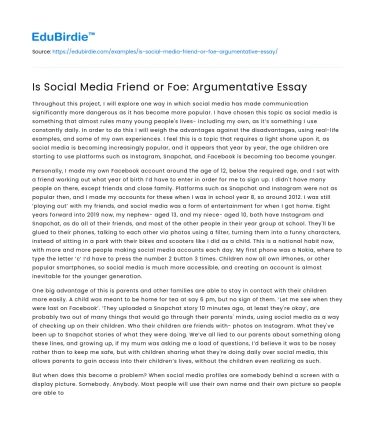Throughout this project, I will explore one way in which social media has made communication significantly more dangerous as it has become more popular. I have chosen this topic as social media is something that almost rules many young people's lives- including my own, as it’s something I use constantly daily. In order to do this I will weigh the advantages against the disadvantages, using real-life examples, and some of my own experiences. I feel this is a topic that requires a light shone upon it, as social media is becoming increasingly popular, and it appears that year by year, the age children are starting to use platforms such as Instagram, Snapchat, and Facebook is becoming too become younger.
Personally, I made my own Facebook account around the age of 12, below the required age, and I sat with a friend working out what year of birth I’d have to enter in order for me to sign up. I didn't have many people on there, except friends and close family. Platforms such as Snapchat and Instagram were not as popular then, and I made my accounts for these when I was in school year 8, so around 2012. I was still ‘playing out’ with my friends, and social media was a form of entertainment for when I got home. Eight years forward into 2019 now, my nephew- aged 13, and my niece- aged 10, both have Instagram and Snapchat, as do all of their friends, and most of the other people in their year group at school. They'll be glued to their phones, talking to each other via photos using a filter, turning them into a funny characters, instead of sitting in a park with their bikes and scooters like I did as a child. This is a national habit now, with more and more people making social media accounts each day. My first phone was a Nokia, where to type the letter ‘c’ I’d have to press the number 2 button 3 times. Children now all own iPhones, or other popular smartphones, so social media is much more accessible, and creating an account is almost inevitable for the younger generation.
Save your time!
We can take care of your essay
- Proper editing and formatting
- Free revision, title page, and bibliography
- Flexible prices and money-back guarantee
One big advantage of this is parents and other families are able to stay in contact with their children more easily. A child was meant to be home for tea at say 6 pm, but no sign of them. ‘Let me see when they were last on Facebook’. ‘They uploaded a Snapchat story 10 minutes ago, at least they're okay’, are probably two out of many things that would go through their parents' minds, using social media as a way of checking up on their children. Who their children are friends with- photos on Instagram. What they've been up to Snapchat stories of what they were doing. We’ve all lied to our parents about something along these lines, and growing up, if my mum was asking me a load of questions, I’d believe it was to be nosey rather than to keep me safe, but with children sharing what they're doing daily over social media, this allows parents to gain access into their children’s lives, without the children even realizing as such.
But when does this become a problem? When social media profiles are somebody behind a screen with a display picture. Somebody. Anybody. Most people will use their own name and their own picture so people are able to find them, but is everyone really who they say they are? After all, if I changed my name on Facebook to Michelle Brown, and used a woman's photo from google images to everyone I have as a page, I have now become a different person. A commonly increasing problem is people using social media to groom children. Children are not as ‘street smart’ as they used to be, as they spend more time indoors on their phones nowadays, so are more naive to this sort of issue. The increasing popularity of social media creates the idea that if somebody you don't know tries to add you as a friend, and you have mutual friends, you must know them somehow. They might be the friend of a friend, they might know you from a party or might have just moved into the area and want to get to know people. It couldn't possibly be a stranger, could it? It’s a photo of someone the same gender as you who appears to be around your age, which seems harmless. So you accept. Even at 20 years old, I am guilty of this. But say a child, who is more gullible in believing it really is another young child trying to become friends, and who is less aware of online predators, is much more vulnerable. This was sadly the case for Ashleigh Hall, a 17-year-old student from Darlington, who was raped and murdered in 2009, after telling her mother she was staying at a boy's house. Said boy, who posed online as a teenager, was, in reality, a 33-year-old man living in his car.






 Stuck on your essay?
Stuck on your essay?

